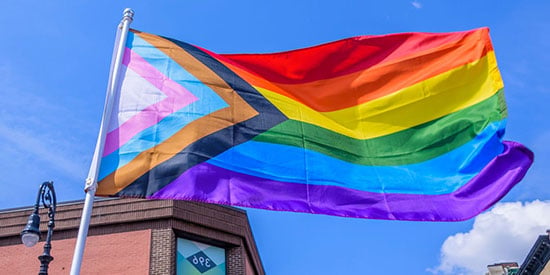'My disability was not a hindrance it was the value': Deakin leads the way in research with LGBTIQA+ people with disability
Research news
LGBTIQA+ people with disability continue to be misunderstood by health, disability and LGBTIQA+ services, according to a recent Deakin University study.
Research lead Dr Amie O’Shea from Deakin’s Institute for Health Transformation and a lecturer in Disability and Inclusion in the University’s School of Health and Social Development, said healthcare and disability support services have a significant opportunity through this research to recognise and respond to the issues facing LGBTIQA+ people with disability.
Significantly, the research is the first-of-its-kind to capture the lived experiences of LGBTIQA+ people with disability in Victoria as peer researchers and research participants. Funded by Pride Foundation Australia in collaboration with the Department of Premier and Cabinet, it will be launched in a report titled “More Than Ticking a Box” on 4th March 2021, in partnership with Deakin and Pride Foundation Australia.
“It’s clear from previous research that there are significant numbers of LGBTIQA+ people with disability. We need to understand more about their experiences in order to address current gaps or issues with service provision and community connections,” said Dr O’Shea.
“We wanted to learn more about the experiences of LGBTIQA+ people with disability in services and in their communities, like the National Disability Insurance Scheme for example. This work prioritised their voices, their experiences, and their lives.”
‘Nothing about us, without us’ – authentic participation of LGBTIQA+ people with disability
Dr O’Shea and academic colleagues Dr J. R. Latham (Alfred Deakin Institute) and Associate Professor Patsie Frawley (University of Waikato) conducted the research with four peer researchers who all identify as LGBTIQA+ people with disability. Ms Sherrie Beaver, Mr Jake Lewis, Mx Ruby Mountford and Mellem Rose joined the Deakin team for the duration of the research.
An important element of the research was its inclusive and accessible approach to showcase the continued need for authentic participation of LGBTIQA+ people with disability, from design to delivery, in research that is about them.
Mellem Rose described previous consultations with LGBTIQA+ and disability organisations as dehumanising and poor-value.
“It seemed like they just wanted to tick a box to say they consulted people with disabilities. I didn’t get paid. One time I was even given a lolly bag with a hat, a straw and a balloon.
“I felt like this process and my work [with Deakin] as a peer researcher was the complete opposite of that, where I felt my disability was not a hindrance, it was the value,” Mellem Rose said.
Managing multiple identities
A key finding was that LGBTIQA+ people with disabilities are forced to mask, closet and silo their sexuality and disability identities in different settings and services. In focus groups, participants powerfully articulated their needs, concerns and experiences, saying:
“We don’t come out once in our life; most of us come out every day, and I have to keep doing that around my sexuality, but also around my disability. My disability is very non-visual; it’s in here [points to head], and it’s the things that I can do and the things that I can’t do… but it is difficult, in a workplace, to cover both of these [identities] at once.”
“I have to go back to my gynaecologist soon, because it’s time for my next check, since the last one five years ago, and since then, I’ve explored my gender, and come out, and things like that; so I’m sort of wondering if there’s any point in disclosing my trans identity, or if I should just closet myself. Because is there any point in doing the work to educate them? Because it’s almost certain they won’t know already. Or is that energy better spent on just getting through the whole experience?”
“I think often it’s easier to be one or the other, and you don’t often get to be both. You either get to be the person with a disability, and you don’t always disclose, as others have said; or you get to be the gay person, but you don’t get your disability side of you actually acknowledged, or sort of… I don’t know. I think you often get split between the two, or between however many there are.”
“Whenever I need to get medical care, or therapy, or anything like that. You need to sort of pick which part is most important immediately, because there’s almost never any option that covers all the bases at once.”
Meaningful consultation, meaningful outcomes
There isn’t an easy solution to the complex ways LGBTIQA+ people with disability experience exclusion and marginalisation, especially when trying to access health and advocacy services.
“This research demonstrates that people whose access is being discussed must be included in consultation, research, service and policy development for meaningful outcomes to be achieved,” Dr O’Shea said.
“Our lived experiences mean we [LGBTIQA+ people with disability] are able to see where the gaps and problems are that often slip through the cracks without our expertise,” Mellem Rose said.
Register now to attend the virtual research report launch, “More Than Ticking a Box”, on Thursday, 4th March 2021.
Hear from researchers and community advocates about their projects supported by Pride Foundation Australia’s disability grants program. This will include presentations from peer-researchers on evidence-based information and practical support for you, your organisation and LGBTIQA+ people with disabilities in Australia.
Share this story

Key Fact
Register now to attend the virtual research report launch, “More Than Ticking a Box”, on Thursday, 4th March 2021 by following the link at the bottom of the article.
